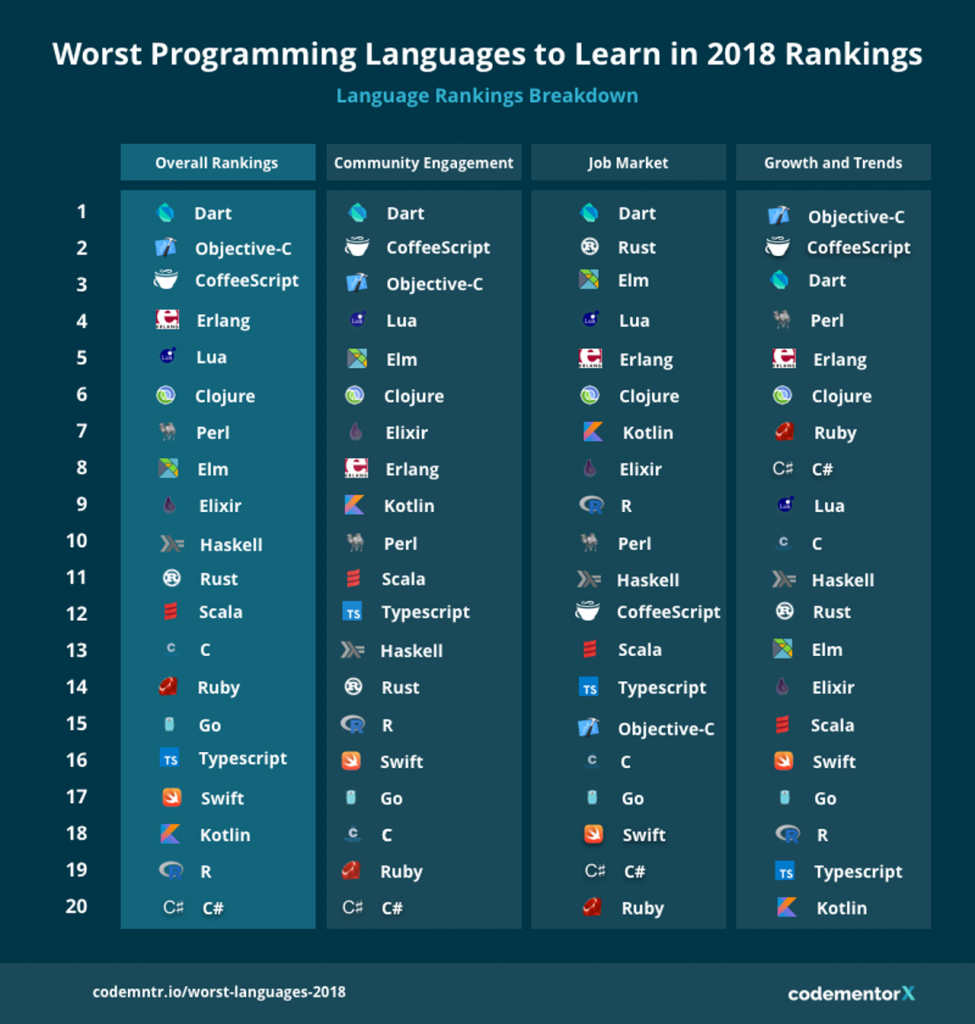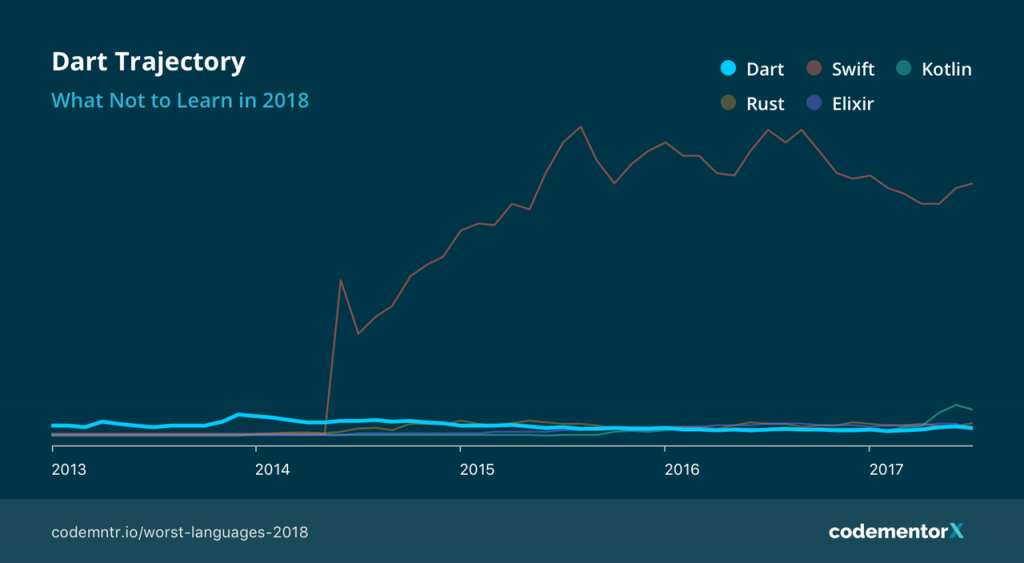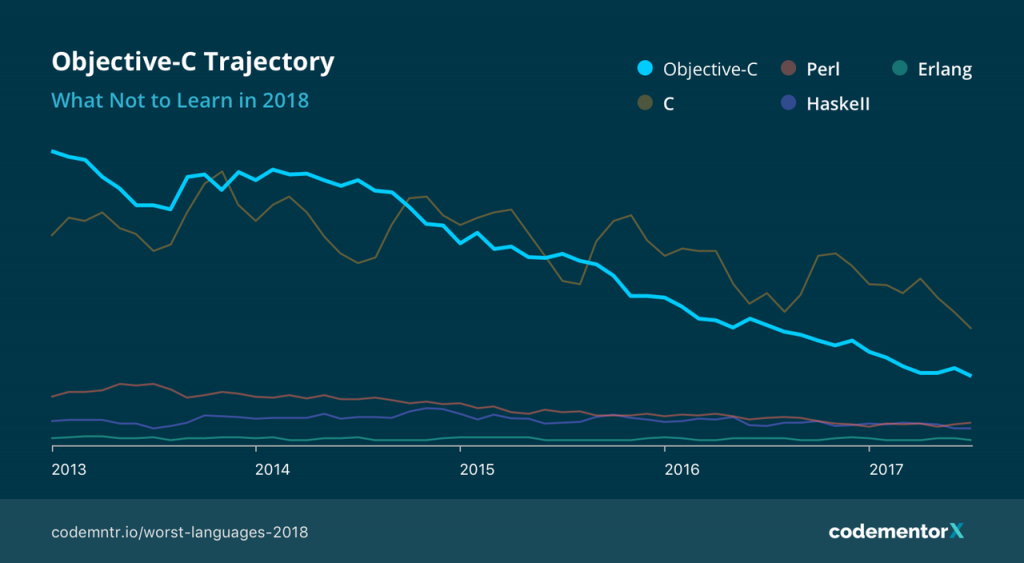
Articles
These Are the Worst Programming Languages to Learn in 2018
By Henry Kronk
February 27, 2018
Many sources spend a lot of time trying to determine which programming languages are best to learn. They focus on employability, how widespread a given language is, it’s trajectory over time, and any number of other factors. A recent report by Codementor, however, takes a different tack. The Silicon Valley-based career marketplace has compiled “The Worst Coding Languages to Learn in 2018.”
An enterprising coder, especially someone working freelance, is both determined and sought out based on the languages in which they are proficient. In today’s workforce, learning a new programming language can level you up and make you stand out in the pack.
But it can also be a big waste of time. As Codementor reiterates, “we are in no way disparaging the usefulness of these languages or questioning their worth. This post merely assesses the performance of these languages based on three criteria: community engagement, the job market, and growth (level of developer interest in working with the language).”
The five worst languages to learn go as follows: Dart, Objective-C, CoffeeScript, Erlang, and Lua.

That’s a fairly interesting mix. Some languages, like Objective-C, have had their day in the sun. Others, like Dart, are relatively new. And CoffeeScript? What does that even do?
Stop Learning Dart
This one is kind of a surprise. It was developed as a general purpose language by Google in 2011. The company still uses it to develop apps on various different devices as well as Internet of Things gadgets. But despite its use by one of the biggest tech developers in the world, it appears to be on the way out.

As Codementor notes, “Dart came in dead last in terms of the number of companies using it in their stacks. While Google, Wrike, Workiva, and Blossom use Dart, there doesn’t seem to be a large number of jobs for Dart developers.”
But there’s also a silver lining. “The good news is that Dart developers have less competition compared to developers who work with other languages. Of the languages we surveyed, Dart developers are relatively rare. This means when they’re needed, they might be able to command a higher rate. The flip side, is, however, they’re also competing for very few jobs.”
Objective-C presents a different story altogether
It was developed in 1984 and widely used until just a few years ago. Apple developed both the OS X and iOS operating systems with it. When Swift was created in 2014, many Objective-C developers made the transition and never looked back.

Like with Dart, just because of the low score, it doesn’t mean that the things are all bad for Objective-C developers. “Despite its age, and the rise of Swift, Objective-C is faring quite well when it comes to the job market. Objective-C ranked 4th for the number of businesses using it, 5th for developer supply, and 6th place overall for its job market ranking.”
“For current Objective-C developers, there should be plenty of jobs available with companies that need to maintain their legacy code. However, there are also many Objective-C developers for companies to choose from, which makes it essentially a buyer’s market.”
The rest of the programming languages in the bottom 5 have, by and large, led more obscure lives. As you might guess from its name, Coffeescript transcompiles into JavaScript. Any JavaScript library can integrate seamlessly with the language, and there’s no live interpretation work to be done. While pockets of developers around the internet still use and discuss the language, it has largely faded from popularity.
Lua, an embeddable scripting language, is still often used in gaming and web servers. It’s one of the older programming languages. Developed in 1993, it saw popularity at one time, but those days are gone.
Erlang, finally, is primarily used in banking, e-commerce, instant message, and telecommunications. Looking just at the number of Github repositories (a factor in the survey), it ranked 17th. Many developers simply aren’t working with it much anymore.
Codementor concludes by saying that you should take their report with a grain of salt for two reasons:
“First, these rankings were derived from how well a language performed on the three particular metrics we listed above. The 20 languages we chose might perform well and even be listed as “languages to learn” based on other metrics. Therefore, while we don’t recommend learning them as beginners or as a primary language, they are useful in their respective domains.”
“Second, we also acknowledge that there may be inherent biases in the sources that we used. For example, Stack Overflow surveys are biased towards English-speaking developers and stackshare.io is biased towards companies with employees or founders who fill out information on the website.”
“Before we conclude, we want to reiterate that the five languages we chose may be less competitive on our metrics but are still useful in their respective domains. If you’re inspired by this list to learn them for fun or as a side project — and not as a primary language that will help you make a living or a career — by all means, go for it!”









[…] (April 26) and ELearningInside.com (April 28) reported that FIT’s Infor/DTech Lab and IBM are partnering to help build the creative […]